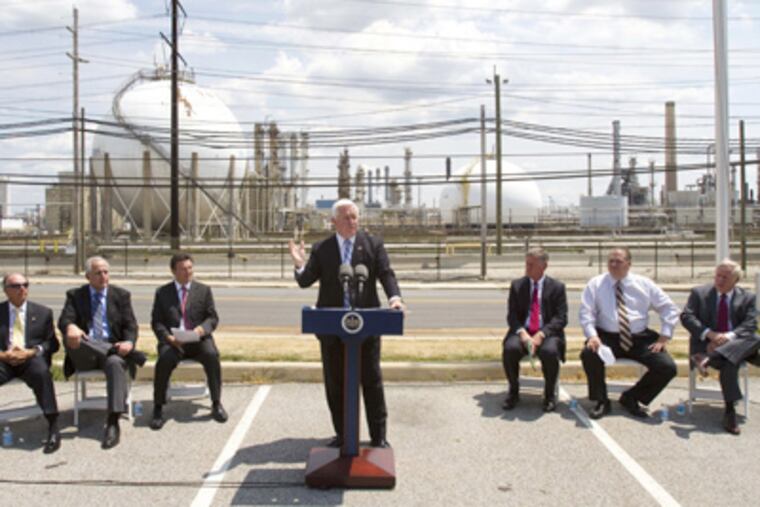Pennsylvania provides $15 million grant to save Marcus Hook jobs
For the third time in three months, Gov. Corbett on Wednesday stood in front of the stained steel towers of a Philadelphia-area refinery to unveil a state-subsidized deal to save jobs in the oil and petrochemical industry.

Another day, another refinery deal.
For the third time in three months, Gov. Corbett on Wednesday stood in front of the stained steel towers of a Philadelphia-area refinery to unveil a state-subsidized deal to save jobs in the oil and petrochemical industry.
The governor said the state would provide $15 million to support Braskem America Inc.'s acquisition of a chemical processing unit at Sunoco's Marcus Hook refinery, which will be integrated into Braskem's neighboring plant that manufactures polypropylene plastic.
Sunoco sold the thermoplastic plant to Braskem in 2010 and provided the Brazilian company with raw material under a 10-year supply agreement, but the arrangement was thrown into doubt last year when Sunoco shut down the Marcus Hook refinery as part of a larger plan to exit refining.
Braskem's 119 employees and contractors in Marcus Hook feared that they would become collateral damage from the closure of the Marcus Hook refinery, one of three area refineries that were threatened with permanent shutdowns this year. Two have been saved, also with state assistance.
"If this deal didn't happen, they'd be boarding this place up," said Jeffrey Richards, a Braskem health and safety officer, who stood among plant workers wearing blue jumpsuits who came out into the afternoon sun to hear the governor.
Fernando Musa, who moved from Brazil to Philadelphia in February to become chief executive of Braskem America, said he had "always been confident we would find a solution," but acknowledged that the employees were worried that the company would pull up stakes in Marcus Hook.
The deal assures Braskem of a steady supply of raw material for its plant, which makes 385,000 tons of polypropylene a year, enough to fill about 10 railcars a day. Polypropylene is a ubiquitous material with many uses, such as bottle caps, food containers, and medical devices.
The state grant, delivered in two installments over two years, is contingent upon Braskem investing at least $56 million at the site and creating at least 28 new full-time jobs, for a period of five years. Some of the new hires will be former Sunoco employees who ran the unit before Braskem's acquisition.
Braskem, which acquired Sunoco's chemical unit for $350.7 million two years ago, also employs 90 people at the Center City headquarters of its U.S. operations. Corbett said that those white-collar jobs would have been threatened, too, had Braskem decided to close its Marcus Hook plant. Braskem America also makes polypropylene in Texas and West Virginia and employs 10 at a research facility in Pittsburgh.
Braskem actually announced the acquisition last week after the deal closed June 30. But the state's involvement was kept confidential until Corbett could appear at the photo opportunity Wednesday, where he stood before a backdrop of refinery units and fuel storage tanks.
The Braskem deal is the third involving a state grant. On May 1, the state agreed to pay $30 million toward the $180 million price that Delta Air Lines paid for the ConocoPhillips refinery, and on July 2 the state agreed to pay $25 million in grants to support a new joint venture between Sunoco and the Carlyle Group to run the Philadelphia refinery.
Corbett said the state's investment in all three instances is contingent upon the companies adding new jobs, and retaining them for several years. "When you're looking at the investment, you have to look at what it would have cost us had we done nothing, if we had let these businesses go," Corbett said.
Braskem is acquiring a unit called a propylene splitter, which removes propane from material produced from the refinery to produce "polymer-grade propylene," which is about 98 percent pure. Braskem's plant takes propylene and converts it into polypropylene plastic.
Terms of the acquisition were not disclosed, but Braskem is also acquiring rail facilities to receive raw material from other refineries, as well as storage for its products. Braskem will also still receive utility services from the refinery site — steam, electricity, and wastewater treatment.
Delaware County officials hope the Braskem deal begins a pattern of repurposing parts of the Marcus Hook refinery as a multipurpose energy hub.